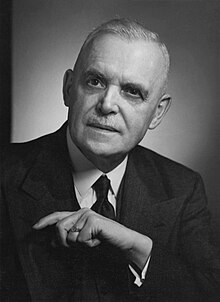
Back لويس سانت لوران Arabic لويس سانت لوران ARZ Луі Сен-Ларан Byelorussian লুই সেন্ট লরেন্ট Bengali/Bangla Louis Saint-Laurent Catalan Louis Saint-Laurent Czech Louis St. Laurent Welsh Louis Saint-Laurent German Louis St. Laurent Spanish Louis St. Laurent Basque
Louis St. Laurent | |
|---|---|
 St. Laurent, c. 1948 | |
| 12th Prime Minister of Canada | |
| In office November 15, 1948 – June 21, 1957 | |
| Monarchs | |
| Governors General | |
| Preceded by | W. L. Mackenzie King |
| Succeeded by | John Diefenbaker |
| Leader of the Opposition | |
| In office June 21, 1957 – January 16, 1958 | |
| Preceded by | John Diefenbaker |
| Succeeded by | Lester B. Pearson |
| Leader of the Liberal Party | |
| In office August 7, 1948 – January 16, 1958 | |
| Preceded by | W. L. Mackenzie King |
| Succeeded by | Lester B. Pearson |
| Minister of Justice Attorney General of Canada | |
| In office September 10, 1948 – November 14, 1948 Acting: July 1, 1948 – September 9, 1948 | |
| Prime Minister | W. L. Mackenzie King |
| Preceded by | James Lorimer Ilsley |
| Succeeded by | Stuart Garson |
| In office December 10, 1941 – December 9, 1946 | |
| Prime Minister | W. L. Mackenzie King |
| Preceded by | Joseph-Enoil Michaud |
| Succeeded by | James Lorimer Ilsley |
| Secretary of State for External Affairs | |
| In office September 4, 1946 – September 9, 1948 | |
| Prime Minister | W. L. Mackenzie King |
| Preceded by | W. L. Mackenzie King |
| Succeeded by | Lester B. Pearson |
| Member of Parliament for Quebec East | |
| In office February 9, 1942 – March 31, 1958 | |
| Preceded by | Ernest Lapointe |
| Succeeded by | Yvon-Roma Tassé |
| Personal details | |
| Born | Louis Stephen St-Laurent February 1, 1882 Compton, Quebec, Canada |
| Died | July 25, 1973 (aged 91) Quebec City, Quebec, Canada |
| Resting place | Saint Thomas d'Aquin Cemetery, Compton, Quebec |
| Political party | Liberal |
| Spouse | |
| Children | 5, including Jean-Paul |
| Alma mater | |
| Profession | Lawyer |
| Signature | |
Louis Stephen St. Laurent PC CC QC (Saint-Laurent or St-Laurent in French, baptized Louis-Étienne St-Laurent; February 1, 1882 – July 25, 1973) was a Canadian lawyer and politician who served as the 12th prime minister of Canada from 1948 to 1957.
Born and raised in southeastern Quebec, St. Laurent was a leading lawyer and a supporter of the Liberal Party of Canada. In December 1941, he entered politics as minister of justice under Prime Minister William Lyon Mackenzie King. In February 1942, he won a by-election in the riding of Quebec East. In September 1946, St. Laurent became secretary of state for external affairs and served in that post until two years later, when he became leader of the Liberal Party and prime minister, succeeding King who retired. St. Laurent carried the party to back-to-back landslide majority governments in the federal elections of 1949 and 1953.
The second French Canadian to hold the office, St. Laurent strongly advocated against communism and was an enthusiastic proponent of Canada joining NATO in 1949 to fight the spread of the ideology. His government also contributed troops to the Korean War. At home, St. Laurent's government introduced the registered retirement savings plan (RRSP) and oversaw the construction of the Trans-Canada Highway, St. Lawrence Seaway, and Trans-Canada Pipeline. St. Laurent earned the nickname "Uncle Louis" as he was popular among the general public throughout his tenure, and the popularity of his government led many to predict that he would easily win the 1957 federal election. However, his decision to rush the 1956 debate on the Trans-Canada Pipeline by invoking closure led some to believe that the Liberals had become arrogant from their two decades in power, and in a major upset, the party was narrowly defeated by John Diefenbaker's Progressive Conservatives, ending nearly 22 years of Liberal rule. Shortly after his defeat, St. Laurent retired from politics and returned to his law practice. He is ranked highly among analysts, not least because of his progressive programs and fiscally responsible policies that helped shape post-war Canada. According to historian Donald Creighton, he was an "eminently moderate, cautious...man...and a strong Canadian nationalist."[1]
- ^ Donald Creighton, The Forked Road: Canada 1939–1957 (1976) 159